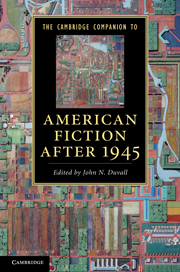Book contents
- Frontmatter
- Introduction: A story of the stories of American fiction after 1945
- PART I POETICS AND GENRES
- PART II HISTORICAL AND CULTURAL CONTEXTS
- PART III MAJOR AUTHORS
- 14 Ralph Ellison
- 15 Flannery O'Connor
- 16 Thomas Pynchon
- 17 Toni Morrison
- 18 Don DeLillo
- Conclusion: Whither American fiction?
- Index
- Cambridge Companions to …
14 - Ralph Ellison
from PART III - MAJOR AUTHORS
Published online by Cambridge University Press: 28 March 2012
- Frontmatter
- Introduction: A story of the stories of American fiction after 1945
- PART I POETICS AND GENRES
- PART II HISTORICAL AND CULTURAL CONTEXTS
- PART III MAJOR AUTHORS
- 14 Ralph Ellison
- 15 Flannery O'Connor
- 16 Thomas Pynchon
- 17 Toni Morrison
- 18 Don DeLillo
- Conclusion: Whither American fiction?
- Index
- Cambridge Companions to …
Summary
“Consciousness and conscience,” admonished Ralph Ellison, “are the burdens imposed upon us by the American experiment.” Penned just months before Lyndon Johnson signed the 1964 Civil Rights Act, Ellison's characterization of a peculiarly American civic obligation undoubtedly reflected his own experience with a Jim Crow that steadily crept to the frontier he called home – Oklahoma. His words were certainly a response to a global struggle for decolonization and to the political unrest and hope inspired by the nation's ongoing revolution in race relations. By May 1964, Ellison, like all Americans, had experienced (if only through newspaper accounts and televised reports) events that are now recognized as crucial to the Civil Rights Movement: the bravery of the “Little Rock Nine,” who helped usher in the judicially mandated desegregation of public schools; the brutal lynching in Mississippi of fourteen-year-old Emmett Till, who had supposedly flirted with a white woman; the year-long bus boycotts spurred by the defiance of Rosa Parks; the march led by Martin Luther King, Jr. on the nation's capital; and the Sunday morning church bombing that killed four girls in Birmingham, Alabama. Ellison's call to “consciousness and conscience” reveals his commitment to the nation's experiment in democracy and offers a slogan capturing the moral aesthetics suffusing his work. He was convinced that writing was “an ethical instrument,” and that American writing, in particular, “might well exercise some choice in the ethic it prefers to support.”
- Type
- Chapter
- Information
- The Cambridge Companion to American Fiction after 1945 , pp. 193 - 206Publisher: Cambridge University PressPrint publication year: 2011

